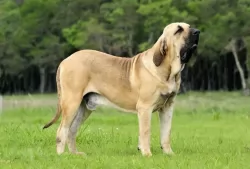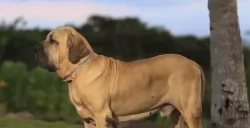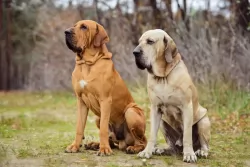 MyDogBreeds
MyDogBreeds Nova Scotia Duck-Tolling Retriever is originated from Canada but Fila Brasileiro is originated from Brazil. Nova Scotia Duck-Tolling Retriever may grow 21 cm / 8 inches shorter than Fila Brasileiro. Nova Scotia Duck-Tolling Retriever may weigh 57 kg / 125 pounds lesser than Fila Brasileiro. Both Nova Scotia Duck-Tolling Retriever and Fila Brasileiro has almost same life span. Both Nova Scotia Duck-Tolling Retriever and Fila Brasileiro has same litter size. Both Nova Scotia Duck-Tolling Retriever and Fila Brasileiro requires Moderate maintenance.
Nova Scotia Duck-Tolling Retriever is originated from Canada but Fila Brasileiro is originated from Brazil. Nova Scotia Duck-Tolling Retriever may grow 21 cm / 8 inches shorter than Fila Brasileiro. Nova Scotia Duck-Tolling Retriever may weigh 57 kg / 125 pounds lesser than Fila Brasileiro. Both Nova Scotia Duck-Tolling Retriever and Fila Brasileiro has almost same life span. Both Nova Scotia Duck-Tolling Retriever and Fila Brasileiro has same litter size. Both Nova Scotia Duck-Tolling Retriever and Fila Brasileiro requires Moderate maintenance.
 The Nova Scotia Duck Tolling Retriever dog was bred in the 19th-century in Nova Scotia, Eastern Canada.
The Nova Scotia Duck Tolling Retriever dog was bred in the 19th-century in Nova Scotia, Eastern Canada.
They were used as hunting dogs. Known as the ‘Toller’, the dog was at first referred to as the Little River Duck Dog but it was in 1945 that it became officially recognized by the Canadian Kennel Club as a pure breed.
The dog is a mix of retriever, setter, spaniel and possibly a farm collie mix breed. It was in 1980 that the breed gained national recognition, being declared the provincial dog of Nova Scotia in 1995.
 Hailing from Brazil, and known also as the Brazilian Mastiff, nobody seems to be too sure of the exact origins of the large Fila Brasileiro but it is believed to be a cross between the English Mastiff, the Bulldog and the Bloodhound.
Hailing from Brazil, and known also as the Brazilian Mastiff, nobody seems to be too sure of the exact origins of the large Fila Brasileiro but it is believed to be a cross between the English Mastiff, the Bulldog and the Bloodhound.
Other theories are that the dog comes from a mix of Portuguese and Spanish dogs and that they were bred to guard livestock from predators. Breeds that have no doubt contributed to the modern Fila are the Bullenbeisser, the Bloodhound, Mastiff and Rafeiro do Alentejo. All these dogs have characteristics such as excellent working dog skills, herding instincts as well as courage and tenacity.
The official Brazilian breed standard of the Fila was developed in the 1960s and the Fila Brasileiro Club of America was formed in 1984.
 The Nova Scotia Duck Tolling Retriever is a medium-sized gundog. Both male and female stand at about 42 to 54cm in height and they weigh anything from 17 to 23kg.
The Nova Scotia Duck Tolling Retriever is a medium-sized gundog. Both male and female stand at about 42 to 54cm in height and they weigh anything from 17 to 23kg.
This beautiful dog is looked upon as the smallest of the retriever dogs. He has a remarkable medium-length, feathery red, copper or golden coat with some white markings and a long feathery tail with medium length, floppy ears. The coat will need brushing twice a week.
He is a powerful dog and also agile with a somewhat worried expression on his face. The expression becomes bright and animated when he is busy working and you’ll notice that the feathery tail is held high with confidence and delight when he is busy working or doing some activity he loves.
The Nova Scotia Duck Tolling Retriever is an intelligent, alert dog who is eager to please its owners.
They are affectionate dogs too, making a splendid family pet. If you’ve got kids in the home, you can trust this dog to get on well with them.
He is energetic, thriving on both physical and mental stimulation. He’ll love a walk every day as this will give him the chance to get out and sniff around. He won’t be content though with just a walk and will want ball games, walks in the park, hikes and swimming. This dog loves water and is well equipped for it with his double coat and webbed paws.
 With his huge head covered in loose skin much like that of a Blooohound, and a body resembling that of a Mastiff, the large heavily built Fila Brasileiro is a mastiff breed from Brazil. He stands at 60 to 75cm in height and he weighs roughly 55 to 80kg.
With his huge head covered in loose skin much like that of a Blooohound, and a body resembling that of a Mastiff, the large heavily built Fila Brasileiro is a mastiff breed from Brazil. He stands at 60 to 75cm in height and he weighs roughly 55 to 80kg.
The ears of the Fila are large and droop down or are folded back, depending on his mood. The tail is long and slim. The coat of the dog is short and dense with the texture being quite smooth and soft. Colours of the coat can vary from solid fawn or black to red to brindle.
Perhaps the huge Fila wouldn’t be a good choice as a pet for the first-time inexperienced dog owner as he is a powerful, intelligent, self-assured, headstrong animal that will certainly need to have training and socialization if you want him as an obedient pet in your home.
He is a dog known for his courage and bravery. The Fila is loving and affectionate with his human family, being protective of them and not being too friendly with strangers. He isn't a particularly good pet choice with children in the home.
Some people, after buying a cute Fila puppy, put him out in the yard when he becomes large, and then they pretty much neglect him. This is cruel and irresponsible as he is a social, playful dog who wants to be part of his human family.
These dogs have some aggression in them and this makes them good watchdogs. They generally don’t show aggression towards their family but may snap at a stranger who tries to touch as he feels threatened.
 Your Toller is a high energy dog, and with the right family he is going to be an absolute joy to have. Give him lots of activities to stimulate him physically and mentally as he is an intelligent dog.
Your Toller is a high energy dog, and with the right family he is going to be an absolute joy to have. Give him lots of activities to stimulate him physically and mentally as he is an intelligent dog.
He is playful and social and full of life, although he is wary around strangers. Just like with most dogs, he will need training and socialization to round him off, making him obedient and well balanced.
With this good-natured pet, you will have a wonderful family friend and enthusiastic sport companion.
 The Fila Brasileiro or Brazilian Mastiff is a powerful dog and it is believed that a large dog like this can be a danger to people if he isn’t trained and socialized.
The Fila Brasileiro or Brazilian Mastiff is a powerful dog and it is believed that a large dog like this can be a danger to people if he isn’t trained and socialized.
He is therefore not recommended for first time dog owners or homes with small children. He is a dog that is particularly wary of strangers too.
When he has been properly socialized he can be loving, loyal and obedient because it is essentially how a dog is brought up as to how he turns out.
If you bring one of these big, beautiful dogs into your home, have him socialized as a puppy, treat him firmly, but kindly and you could have yourself an extraordinary pet.
 These dogs are robust, but certain genetic disorders do occur in the breed because of the smallish gene pool. Some of the biggest health problems they face are hip dysplasia and progressive retinal atrophy.
These dogs are robust, but certain genetic disorders do occur in the breed because of the smallish gene pool. Some of the biggest health problems they face are hip dysplasia and progressive retinal atrophy.
This eye disease is all about a group of degenerative eye disorders that cause blindness in both eyes of the dog.
The first symptom of this disease is night blindness where you see your dog being reluctant to go outside or to go up and down stairs in dim light. The surface of the eyes will get that cloudy, glazed-over look and as the disease progresses, you’ll find your pet bumping into things.
Mercifully it isn’t painful but you will need to get your pet to the vet to manage the condition.
 Filas are a dog breed who have a high rate of hip- and elbow dysplasia. This is a serious disease which can lead to lameness with your pet. Other orthopedic diseases with the breed include osteochondritis and luxating patella.
Filas are a dog breed who have a high rate of hip- and elbow dysplasia. This is a serious disease which can lead to lameness with your pet. Other orthopedic diseases with the breed include osteochondritis and luxating patella.
Also, as a deep-chested dog breed, your Fila also is at risk of getting the very serious gastrointestinal syndrome known as bloat. This is a common condition that can prove deadly for your pet. The Fila’s stomach will fill with gas, putting pressure on other organs and stopping blood flow to the heart and difficulty with breathing. Sometimes the stomach will twist. Get him to the vet immediately if you notice a swollen stomach, drooling or restless behaviour.
 Tollers are energetic dogs and you won’t have to extend a second invitation to this dog to join you on your walks, hikes, hunting and swimming. It is perhaps why he is better suited to country living as opposed to living in the city.
Tollers are energetic dogs and you won’t have to extend a second invitation to this dog to join you on your walks, hikes, hunting and swimming. It is perhaps why he is better suited to country living as opposed to living in the city.
You want to ensure the best food for your four-legged friend, but the idea is to keep things simple and nutritious for your dog.
Your pet can’t tell you when he’s got a stomach-ache from eating the wrong foods so you have to be careful what you feed him. You want to make sure that the food you give your dog is balanced for the stage of life he or she is in – puppy, young adult, pregnancy, ill dog or senior dog.
You’ve also got to see whether your dog is small or large, active or a couch-potato type of dog, and choose commercially manufactured foods that cater for the kind of dog he is.
It is fine to feed your dog a kibble food or you can mix in some chopped up boiled chicken, brown rice or pasta and some vegetables such as carrots, sweet potatoes and spinach. Some raw meat added in when you can afford it, will also do your pet the world of good.
You can see from this diet, it is uncomplicated, plain, wholesome food and will do your pet good.
Always be careful of bones with your dog and speak to your vet first before you opt to give your dog bones.
Never leave your pet without a constant supply of fresh, cool water.
Both dogs and owners benefit when a dog has been trained and socialized. The dog is balanced and obedient and a stronger relationship develops between owner and dog because of the dog being well behaved. The Nova Scotia Duck-Tolling Retriever is an intelligent dog so he won’t have any trouble with training.
 The Filas size makes it important that he have a good amount of exercise if you want to maintain his health and happiness. He isn’t a dog suited to city life as he is too large and will irritate his owners when cooped up in a tiny space with them. He isn’t demanding when it comes to exercise and activities all the time, but he should still be exercised regularly as he is inclined to become lazy .
The Filas size makes it important that he have a good amount of exercise if you want to maintain his health and happiness. He isn’t a dog suited to city life as he is too large and will irritate his owners when cooped up in a tiny space with them. He isn’t demanding when it comes to exercise and activities all the time, but he should still be exercised regularly as he is inclined to become lazy .
Moderate shedding. Regular brushing twice a week will be required. Check ears for infection and brush his teeth 2 or 3 times a week.
Nothing is set in stone as to what to feed your Fila Brasileiro, but a large dog will require quality food with a good amount of protein and fat according to size, age and activity levels.
Because a large breed dog is prone to hip dysplasia, look out for ingredients such as chondroitin and gludosamine which are specifically good for joint health. Try and avoid commercially manufactured food with common allergens such as soy, corn and wheat, artifical flavors and fillers.
A source of cooked rice, chicken and vegetables as well as some raw meat will be excellent for your big pet. Make sure he is never deprived of fresh, cool drinking water.